IRVING GOH
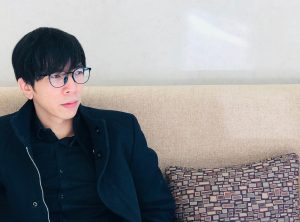 Associate Professor Irving Goh (NUS Department of English Language and Literature) recently received the FASS Award for Excellent Researcher (AER), which is presented to researchers based on the overall impact and strength of their research. The successful researcher would have “achieved consistent research excellence, produced a piece of research of great impact and be recognised by the research community as having achieved a significant breakthrough.” A/P Goh has published three books: The Reject: Community, Politics, and Religion After the Subject (Fordham University Press, 2014); L’Existence Prépositionnelle (Galilée, 2019); and The Deconstruction of Sex (Duke University Press, 2021), co-authored with Jean-Luc Nancy, with a fourth - Touching Literature, or the Experience of the Limit - under contract with Cornell University Press. The Reject was awarded the MLA 23rd Aldo and Jeanne Scaglione Prize for Best Book in French and
Associate Professor Irving Goh (NUS Department of English Language and Literature) recently received the FASS Award for Excellent Researcher (AER), which is presented to researchers based on the overall impact and strength of their research. The successful researcher would have “achieved consistent research excellence, produced a piece of research of great impact and be recognised by the research community as having achieved a significant breakthrough.” A/P Goh has published three books: The Reject: Community, Politics, and Religion After the Subject (Fordham University Press, 2014); L’Existence Prépositionnelle (Galilée, 2019); and The Deconstruction of Sex (Duke University Press, 2021), co-authored with Jean-Luc Nancy, with a fourth - Touching Literature, or the Experience of the Limit - under contract with Cornell University Press. The Reject was awarded the MLA 23rd Aldo and Jeanne Scaglione Prize for Best Book in French and
Francophone Studies. He has also edited the following books: French Thought and Literary Theory in the UK (Routledge, 2019), Nancy Now (Polity Press, 2014), co-edited with Verena Andermatt Conley, and Jean-Luc Nancy Among the Philosophers (Fordham University Press, forthcoming). A/P Goh's current primary research interests are in affect theory, autotheory, World Literature theories, contemporary Anglo-American literature, and questions of race. He has published articles in Angelaki, Cultural Politics, Arizona Quarterly, MLN, and diacritics, among others.
We congratulated A/P Goh and spoke to him about his research work.
1. How did you come up with the idea for your 2019 book, L’Existence Prépositionnelle?
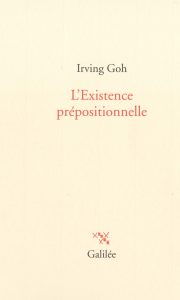 Basically, I was intrigued by the almost insistent presence of the preposition “to” in the conceptual phrases “face to face” (by Emmanuel Levinas), “being-to” (by Jean-Luc Nancy), “hospitality-, democracy-, and justice-to-come” (by Jacques Derrida), and “I love to you” (by Luce Irigaray, which then led me to inquire into its ontological, ethical, and political stakes. Of course, we’re talking about the French preposition, and so I only thought it “natural” to write it in French.
Basically, I was intrigued by the almost insistent presence of the preposition “to” in the conceptual phrases “face to face” (by Emmanuel Levinas), “being-to” (by Jean-Luc Nancy), “hospitality-, democracy-, and justice-to-come” (by Jacques Derrida), and “I love to you” (by Luce Irigaray, which then led me to inquire into its ontological, ethical, and political stakes. Of course, we’re talking about the French preposition, and so I only thought it “natural” to write it in French.
2. What initially drew you to the study of comparative literature?
I was really interested in what was called “French Theory” or “French Thought,” and it was taught mostly in Comp Lit departments in the US. Cornell’s Comp Lit department was one the “theory” powerhouses, and I had the great fortune to study with what some call the three “big hitters” there: Dominick LaCapra, Jonathan Culler, and Timothy Murray. They were all on my dissertation committee, including the late Jean-Luc Nancy (who passed just this August), who served as an external member.
3. What is the book you are currently working on, Touching Literature, or the Experience of the Limit, about?
It is about how literature treats or approaches touch differently from philosophy, i.e. French thought. Through readings of Ovid, Shakespeare, E.E. Cummings, Stanley Kunitz, Proust, Clarice Lispector, and Anthony Doerr, I find a greater audacity in experimenting with limits through touch in literature, while French thought is very much about the respecting of limits when touch is in question.
4. How did you come to collaborate with Jean-Luc Nancy on your new book, The Deconstruction of Sex?
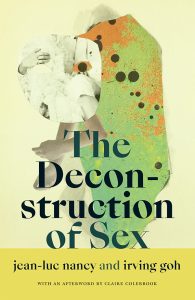 As said above, Nancy was one of my teachers. He was extremely generous with his time and his knowledge. Not only did he agree to being my external dissertation committee member, but he also always gave me something when I was editing a volume (Nancy Now) or journal special issue (the 2-volume special issue of diacritics) on his works. When his Sexistence was published in 2017, I thought it opened up many questions that his book were not able to cover, for example, the implications of a “deconstructive” approach to sex in the age of #MeToo, and how contemporary senses of sex (which we call “sexscription”) might be written in contemporary literary works such as Sally Rooney’s Normal People and Mohsin Hamid’s Exit West. The Deconstruction of Sex, then, was the occasion to further the conversation that Sexistence started.
As said above, Nancy was one of my teachers. He was extremely generous with his time and his knowledge. Not only did he agree to being my external dissertation committee member, but he also always gave me something when I was editing a volume (Nancy Now) or journal special issue (the 2-volume special issue of diacritics) on his works. When his Sexistence was published in 2017, I thought it opened up many questions that his book were not able to cover, for example, the implications of a “deconstructive” approach to sex in the age of #MeToo, and how contemporary senses of sex (which we call “sexscription”) might be written in contemporary literary works such as Sally Rooney’s Normal People and Mohsin Hamid’s Exit West. The Deconstruction of Sex, then, was the occasion to further the conversation that Sexistence started.
5. Which research publication are you most proud of and why?
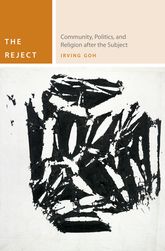 I am very happy with L’existence Prépositionnelle, definitely. It’s after all published by Galilée, hence allowing me to join an illustrious list of French thinkers who have published with the press: Nancy, Derrida, Sarah Kofman, Cixous, Balibar, Rancière, etc. It’s really a bucket-list item. But I am also very proud of my first book, The Reject: Community, Politics, and Religion after the Subject (Fordham UP, 2014). It was immediately welcomed by the late great editor Helen Tartar, and it won one of MLA’s major prizes: the 23rd Aldo and Jeanne Scaglione Prize for Best Book in French and Frencophone Studies in 2015. It is a book where I was able to flesh out my theory of the eponymous “reject,” which is no less an attempt to respond to Nancy’s question of “who comes after the subject.”
I am very happy with L’existence Prépositionnelle, definitely. It’s after all published by Galilée, hence allowing me to join an illustrious list of French thinkers who have published with the press: Nancy, Derrida, Sarah Kofman, Cixous, Balibar, Rancière, etc. It’s really a bucket-list item. But I am also very proud of my first book, The Reject: Community, Politics, and Religion after the Subject (Fordham UP, 2014). It was immediately welcomed by the late great editor Helen Tartar, and it won one of MLA’s major prizes: the 23rd Aldo and Jeanne Scaglione Prize for Best Book in French and Frencophone Studies in 2015. It is a book where I was able to flesh out my theory of the eponymous “reject,” which is no less an attempt to respond to Nancy’s question of “who comes after the subject.”
6. Which philosopher has been most influential for you?
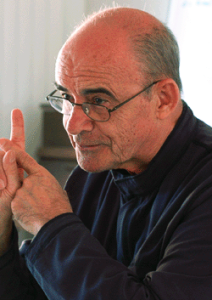
Since I was trained in French thought, I would say Nancy, Derrida, Deleuze, and Catherine Clément. But if I were to pick one, it would be dear Nancy!
7. What has been your most memorable teaching experience at NUS?
Teaching is always memorable because of the students. For me, I enjoy particularly the courses where students are actively engaged in both the materials and class discussions. In that way, I get to learn from students as much as they might learn from the course. This is very much the case for the course I recently taught – Sick Lit: Illness in Literature. Students especially like Muhammad Bin Anwar Bahajjaj, Grace Cheong, and Maria Luisa Cavazos Tinajero really made it special. But I do remember particularly the course Literary Rejects that I taught back in 2018. It was a grad course, but I invited a select group of very good undergrads to attend as well. It ran like a good grad course one gets in good US universities, and I remember students like Sheena Koh (’18) who posed such critically insightful questions that pushed me to explicate my theory of the “reject” even clearer, if not made me think about it in ways I had never thought before. Each session was so intense and we went almost the full 3 hours, but I believe we all enjoyed every moment.
8. Lastly, what future research projects are you planning?

My current book project is provisionally called Living On After Failure. It takes quite a distance from French thought or French theory. It’s definitely closer to recent affect theory and cover contemporary writers such as Rachel Cusk, Ottessa Moshfegh, Yiyun Li, and Kate Zambreno. I’ve already given talks on this topic at Yale, Chicago, Cornell, Princeton, and HKU, and I can’t wait to complete it.
Thank you very much for taking the time to answer these questions, A/P Goh! And congratulations again on being awarded Excellent Researcher!

